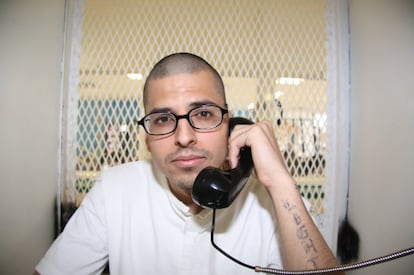Texas killer who battled his own lawyers to be executed gets his wish
Daniel López fought to be given lethal injection rather than linger on death row for decades

In an unusual death penalty case, a 27-year-old Mexican-American man got what he had been fighting for for years – to be quickly put to death by lethal injection at a Texas prison rather than linger on death row while his lawyers mounted a protracted legal battle to save his life.
Daniel Lee López was pronounced dead at Huntsville State Prison 15 minutes after authorities gave him the lethal doses. He had been convicted and sentenced to death for killing a 47-year-old police officer in Corpus Christi, Texas in 2009, by ramming his SUV vehicle into him as he was putting up spike strips to stop López escaping during a high-speed chase.
I didn’t do it on purpose but I killed a policeman as I tried to escape”
In Texas – which carried out 11 executions last year, the most of any US state – death row inmates launch long legal battles that can take up to between 15 and 20 years to avoid lethal injection.
But López fought with his lawyers and insisted that he wanted to be put to death quickly. His attorneys filed a last-minute appeal with the US Supreme Court, which was rejected on Wednesday.
“I accept my punishment – I didn’t do it on purpose but I killed a police officer as I was trying to escape,” he said in a recent interview. “It wasn’t intentional but I feel responsible and that is why I am ready to go.”
López was pronounced dead at 6.31pm (CDT).
Before killing Officer Stuart Alexander, López, who was on probation on a prior criminal charge, had punched another police official before fleeing the scene.
Among the arguments his attorneys used in his defense was that López was mentally ill and should be sentenced to life imprisonment. But a court jury rejected those pleas at a trial in 2010.
The death penalty expert lawyers James Rytting, David Dow and Jeffrey Newberry, again brought up his mental illness and his suicidal tendencies before the US Supreme Court.
“It is clear that López has been allowed to use the legal system to take his own life,” said Dow.
But López wrote letters to a federal judge and pleaded for his execution to move forward. Last week, he said that a Supreme Court reprieve would be "disappointing."
“I’ve accepted my fate,” he said. “I’m just ready to move on.”
López became the 528th person to be executed in Texas since the death penalty was reinstated by the US Supreme Court in 1976. He was also the 10th person to die by lethal injection this year in the state, and the 19th to be executed in the country as a whole.
The only Spaniard on death row in the US, is waiting for the Florida Supreme Court to decide on granting him a new trial
Meanwhile, US attorneys for Pablo Ibar, the only Spaniard currently on death row in the United States, await a Florida Supreme Court’s decision on granting him a new trial.
The son of Basque immigrants, who holds dual Spanish-US citizenship, Ibar was sentenced to death for the 1994 murders of two models and a nightclub owner.
The Florida Supreme Court held oral arguments in his appeal case on April 8, 2014, according to the court docket.
English version by Martin Delfín
Tu suscripción se está usando en otro dispositivo
¿Quieres añadir otro usuario a tu suscripción?
Si continúas leyendo en este dispositivo, no se podrá leer en el otro.
FlechaTu suscripción se está usando en otro dispositivo y solo puedes acceder a EL PAÍS desde un dispositivo a la vez.
Si quieres compartir tu cuenta, cambia tu suscripción a la modalidad Premium, así podrás añadir otro usuario. Cada uno accederá con su propia cuenta de email, lo que os permitirá personalizar vuestra experiencia en EL PAÍS.
¿Tienes una suscripción de empresa? Accede aquí para contratar más cuentas.
En el caso de no saber quién está usando tu cuenta, te recomendamos cambiar tu contraseña aquí.
Si decides continuar compartiendo tu cuenta, este mensaje se mostrará en tu dispositivo y en el de la otra persona que está usando tu cuenta de forma indefinida, afectando a tu experiencia de lectura. Puedes consultar aquí los términos y condiciones de la suscripción digital.








































